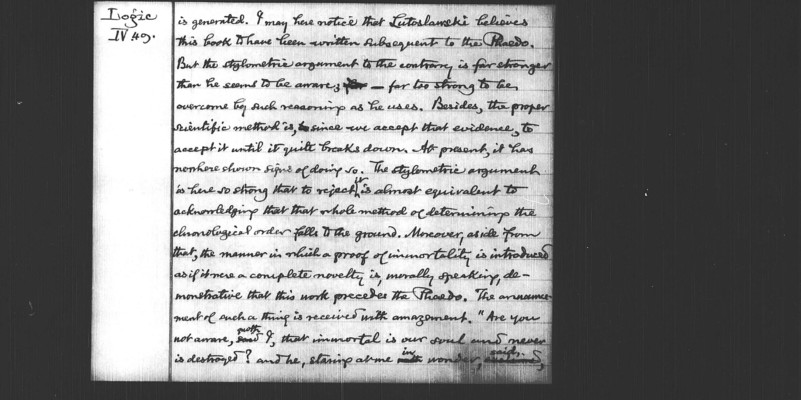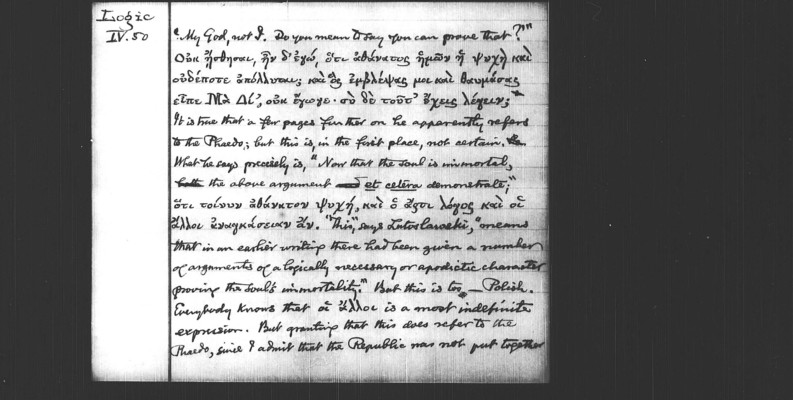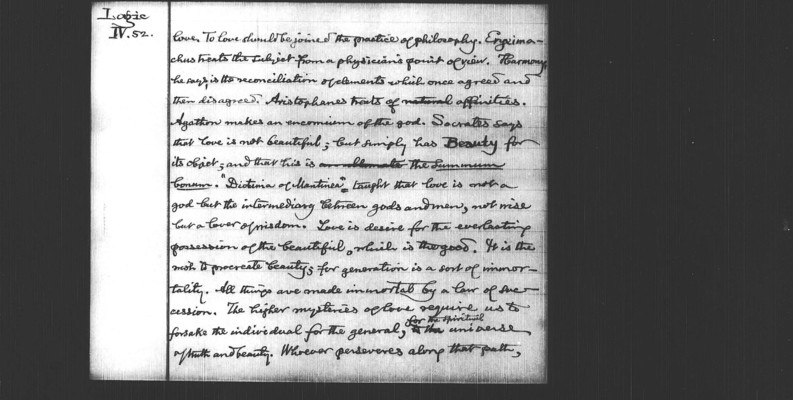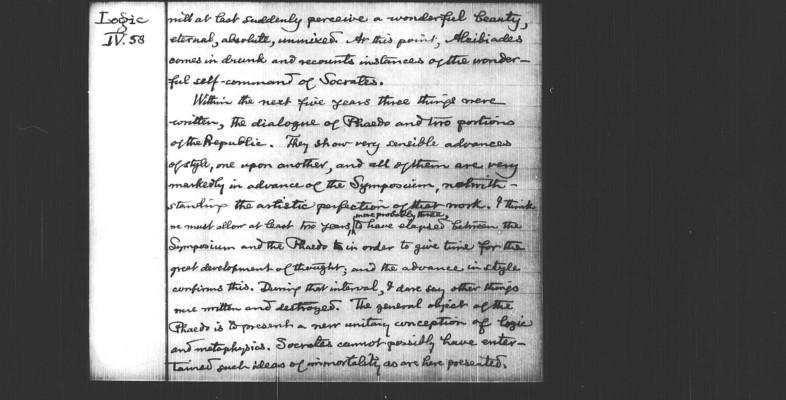Pages
46
Logic IV. 49 is generated. I may here notice that Lutoslawski believes this book to have been writen subsequent to the Phaedo. But the stylometric argument to the contrary is far stronger than he seems to be aware; far too strong to be overcome by such reasonings as he uses. Besides, the proper scientific method is, since we accept that evidence, to accept it until it quite breaks down. At present it has nowhere shown signs of doing so. The stylometric argument as here so strong that to reject it is almost equivalent to acknowledging that that whole method of determining the chronological order falls to the ground. Moreover aside from that the manner in which a proof of immortality is introduced as if it were a complete novelty is morally speaking demonstrative that this work precedes the Phaedo. The announcement of such a thing is received with arrangement. "Are you not aware with I, that immortal is our soul and never is destroyed? and he staring at me in wonder said
47
Logic IV. 50 'My God, not I. Do you mean to say you can prove that?" [Foreign text]. it is true that a few pages further on he apparently refers to the Phaedo but this is in the first place not certain. When he says precisely is "Now that the soul is immortal the above argument et cetera demonstrate" [Foreign text]. This says [Lutoslavoski?] "means that in an ealier writing there had been given a number of arguments of a logically necessary or apodictic character proving the soul's immortability." But this is too Polish. Everybody knows that [foreign text] is a most indefinite expression. But granting that this does refer to the Phaedo since i admit that the Republic was not put together.
48
Logic IV. 51 until someone after the publication of the Phaedo which was easier than to modify the original expression by an interlineation so as vaguely to refer to that dialogue? The whole method of stylometry is not to be overthrown by such as argument! Apart from that there are other indications in this book of its antidating the Phaedo. But I shall not stop to adduce them because they not indubitable like this. After the doctrine of imortality the subject or reward and punishments in this life and the next is discussed; and the whole ends with on of Plato's great dreams this one about choosing one's own life the rive of Lethe, etc. The Symposium completes the quateruion of lessons which Plato deemed indespensibel to the teaching of his school by taking up the tremendous subject of Love. It was written probably 355 BC. A succession of speeches are made about Love. Phaedo shows to what lofty acts it inspires men and women. Pausanias discourses of the higher.
49
Logic IV. 52 love. To love should be joined the practive of philosophy. Eryximachus treats the subject from a physicians point of view. Harmony he says is the reconciliation of elements which once agreed and then disagreed. Aristophanes hearts of natural affinities. Agathon makes an [encomium?] of the god. Socrates says that love is not beautiful, but simply has beauty for its object and that this is the Summum Conum. "Diotima of Mantinea" taught that love is not a god but the intermediary between gods and men, not wise but a lover of wisdon. Love is desire for the everlasting possession of the beautiful which is the good. He is the wish to procreate beauty for generation is a soul of immortality. All this are made immortal by a law of succssion. The highter mysteries of love require us to forsake the individual for the general for the spiritual universe of truth and beauty. Whoever perserveres along that path,
50
Logic IV. 58 will at last suddenly perceive a wonderful beauty, eternal, absolute, unmixed. At this point, Aleibiades comes in drunk and recounts instanced of the wonderful self-command of Socrates. Within the next five years three things were written, the dialogue of Phaedo and two portions of the Republic. They show very sensible advances of style one upon another and all of them are very markedly in advance of the Symposium, nonwithstanding the artistic perfection of the work. I think we must allow at least two years more probably three to have elapsed between the Symposium and the Phaedo in order to give time for the great development of thought and the advance in style confirm this. During that interval I dare say other things were written and destroyed. The general object of the Phaedo is to present a new unitary conception of logic and metaphysics. Socrates cannot possibly have entertained such ideas of immortality as we have presented.




